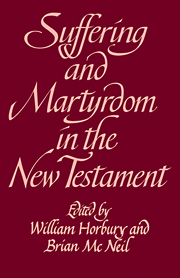 Suffering and Martyrdom in the New Testament
Suffering and Martyrdom in the New Testament Book contents
- Frontmatter
- Contents
- Abbreviations
- G. M. Styler and the Cambridge New Testament Seminar
- 1 Introduction
- 2 Did Jesus teach that his death would be vicarious as well as typical?
- 3 Imitatio Christi and the Lucan Passion narrative
- 4 The persecution of Christians in John 15: 18–16: 4a
- 5 Interchange and suffering
- 6 On the interpretation of Colossians 1: 24
- 7 Preparation for the perils of the last days: 1 Thessalonians 3:3
- 8 Maintaining the testimony of Jesus: the suffering of Christians in the Revelation of John
- 9 Martyrdom and inspiration
- 10 Suffering and martyrdom in the Odes of Solomon
- 11 Suffering and messianism in Yose ben Yose
- 12 What might martyrdom mean?
- Index of authors
- Index of references
- Index of subjects
12 - What might martyrdom mean?
Published online by Cambridge University Press: 26 February 2010
- Frontmatter
- Contents
- Abbreviations
- G. M. Styler and the Cambridge New Testament Seminar
- 1 Introduction
- 2 Did Jesus teach that his death would be vicarious as well as typical?
- 3 Imitatio Christi and the Lucan Passion narrative
- 4 The persecution of Christians in John 15: 18–16: 4a
- 5 Interchange and suffering
- 6 On the interpretation of Colossians 1: 24
- 7 Preparation for the perils of the last days: 1 Thessalonians 3:3
- 8 Maintaining the testimony of Jesus: the suffering of Christians in the Revelation of John
- 9 Martyrdom and inspiration
- 10 Suffering and martyrdom in the Odes of Solomon
- 11 Suffering and messianism in Yose ben Yose
- 12 What might martyrdom mean?
- Index of authors
- Index of references
- Index of subjects
Summary
Most of the members of the New Testament seminar attend its meetings clad in the robes of professional exegesis. Wearing these same robes (or, perhaps, their ‘festal’ version) the other contributors to this volume have come suitably attired to the feast. I feel a little naked. I am not wearing, and cannot wear, a wedding garment. And yet, just as the seminar, and its secretary, have so often in the past made me welcome and encouraged me to feel at home, so the editors have been kind enough to invite me, ill-clad as I am, to share in this celebration.
Nevertheless, the question cannot be avoided: what am I doing here? As one whose work includes consideration of problems of theological method, and aspects of systematic theology and the philosophy of religion, what contribution can I make to a discussion of suffering and martyrdom in the New Testament? Perhaps the question already suggests one form of an answer. All Christians, and not only New Testament scholars, seek to understand the New Testament. But the standpoints froms which understanding is sought are manifold. The individual Christian, meditating on the text, the preacher, the textual critic, the systematic theologian and the exegete, are all concerned with understanding the New Testament. And yet they are clearly not engaged in identical enterprises. How might these different enterprises be characterised, and what relationships obtain, or should obtain, between them?
There is a received account, in this country, both of the character of these enterprises, and of the relationship between them, which goes something like this.
- Type
- Chapter
- Information
- Suffering and Martyrdom in the New TestamentStudies presented to G. M. Styler by the Cambridge New Testament Seminar, pp. 183 - 198Publisher: Cambridge University PressPrint publication year: 1981
- 2
- Cited by
